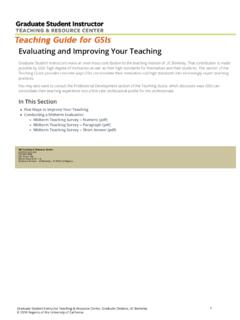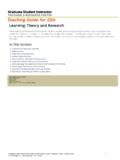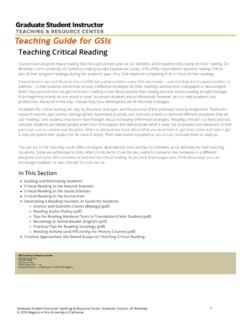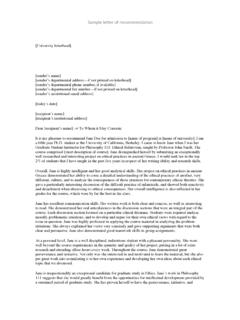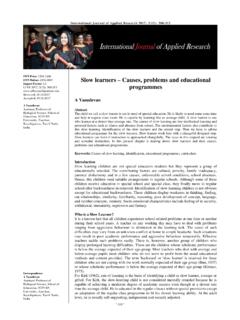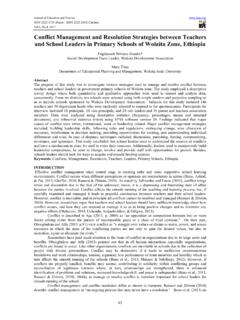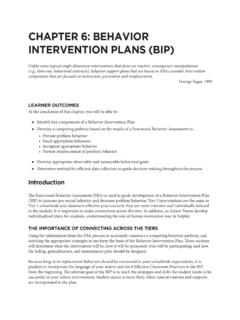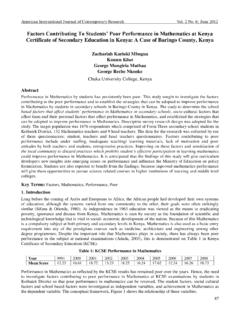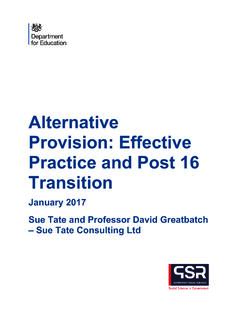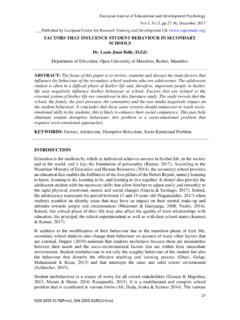Transcription of Academic Misconduct: Cheating, Plagiarism, and Other …
1 Academic misconduct : Cheating, plagiarism , and OtherFormsMost students understand, in a general way, that their Academic achievements are premised on Academic integrity: honesty,fairness, trust, respect, accountability, and responsibility. The Academic community thrives when all members adhere to thesehabits of integrity, and GSIs have an important role in fostering students commitment to Academic misconduct is, fortunately, the exception rather than the norm. However, it does occur. Most GSIs will encounter it insome form in their teaching careers. For that reason, it is important to be aware of what constitutes Academic misconduct and ofthe procedures for addressing it.
2 It is no less important to know the most common causes of Academic misconduct so that, withappropriate instruction, it can be University of California is a community of scholars committed to maintaining an environment that encourages personal and intellectual growth. Itis a community with high standards and high expectations for those who choose to become a part of it, including establishing rules of conductintended to foster behaviors that are consistent with a civil and educational setting. Members of the University community are expected to complywith all laws, University policies, and campus regulations, conducting themselves in ways that support a scholarly environment.
3 In this context, facultyare guided by the Faculty Code of Conduct, Section 015 of the Academic Personnel Manual, and students by the UC Berkeley Campus Code ofStudent Conduct, articulated here. UC Berkeley Campus Code of Student ConductIn This SectionDefining Academic MisconductFactors that Can Contribute to Academic MisconductCheatingExam PreparationProctoring ExamsCheating on Exams: Other FormsPlagiarismPreventing PlagiarismThe Art of ParaphrasingParaphrasing ExerciseDetecting and Addressing PlagiarismIf You Encounter Academic MisconductStudent Academic misconduct .
4 References and ResourcesGSI teaching & Resource Sproul HallOffice Hours 9 12, 1 4 Graduate Division, UC Berkeley | 2016 UC Regents Graduate Student Instructor teaching & Resource Center, Graduate Division, UC Berkeley 2016 Regents of the University of California1 Defining Academic MisconductThe University defines Academic misconduct as "any action or attempted action that may result in creating an unfair Academic advantage for oneself or an unfair Academic advantage or disadvantage for any Other member or members of the Academic community" (UC Berkeley Code of Student Conduct).
5 *When the topic of Academic misconduct comes up, we usually think of cheating and plagiarism . It is a much broader concept,however. Here are Other examples of Academic Misconduct: Interfering with course materials:Removing, defacing, or deliberately keeping from Other students library materials that are on reserve for specific laboratory samples or altering indicators during a practical exam, such as moving a pin in a dissection specimenfor an anatomy or damage of intellectual property:Selling, distributing, website posting, or publishing course lecture notes, handouts, readers, recordings, or Other information provided by an instructor, or using them for any commercial purpose, without the express permission of the instructor.
6 (The University's policy about note-taking specifies several protections for instructor-authored content, including the content that you as an instructor develop, against distribution to people outside the course without the instructor's prior written consent, and against commercial profit by students.**)Sabotaging or stealing another person's assignment, book, paper, notes, experiment, project, or electronic hardware or access to, or electronically interfering with, the property of another person or of the University via computer or Other in the classroom can also serve to create an unfair Academic advantage for oneself or disadvantage for anothermember of the Academic community.
7 Here are some examples that may violate the Code of Student Conduct:Interfering with the course of instruction to the detriment of Other classes or Other Academic activities in an attempt to stifle Academic freedom of to comply with the instructions or directives of the course in falsified bomb activating a fire false information or representation, or fabricating or altering information:Furnishing false information in the context of an Academic to identify yourself honestly in the context of an Academic or altering information or data and presenting it as false or misleading information to an instructor or any Other University University documents:Altering a previously graded exam or assignment for the purpose of a grade appeal or of gaining points in a re-grading process.
8 Forging an instructor's signature on a letter of recommendation or any Other an altered transcript of grades to or from another institution or your name on another person's exam or and plagiarism are perhaps the most prominent forms of Academic misconduct , and they are addressed inlater sections of this chapter of the teaching Guide for GSIs.* Material on this page is drawn mainly from the UC Berkeley Center for Student Conduct and the GSI Professional StandardsGraduate Student Instructor teaching & Resource Center, Graduate Division, UC Berkeley 2016 Regents of the University of California2and Ethics Online Course, Module 5.
9 **UC Berkeley Policy on Course Note-Taking and Materials (pdf).GSI teaching & Resource Sproul HallOffice Hours 9 12, 1 4 Graduate Division, UC Berkeley | 2016 UC Regents Graduate Student Instructor teaching & Resource Center, Graduate Division, UC Berkeley 2016 Regents of the University of California3 factors that Can Contribute to Academic MisconductThis section of the teaching Guide for GSIs addresses some of the common causes of or factors contributing to students commission of Academic misconduct . Addressing these causes and factors can help students negotiate their Academic difficulties without resorting to unfair Study HabitsIneffective Time Management Skills or OverloadPsychological factorsNot Knowing the BoundariesPreventionPrevention through Instructional ApproachesIneffective Study HabitsOne of the most common causes of Academic misconduct is ineffective or inadequate study habits, for example superficial reading practices and last-minute cramming.
10 Some students may need to enlarge their repertoire of Academic strategies to cope with their courses' intellectual demands. If students are not familiar with effective and legitimate strategies, they may be tempted to try dishonest can help students address this issue directly by discussing reading and study strategies with them in class. Do this severalweeks before an exam, and alert students to the problems associated with last-minute cramming and sleep loss. When a studentcomes to your office hours saying he or she is having trouble with the material, ask how the student goes about learning thematerial in his or her study time, and explore ways to improve study or homework strategies for your course.
